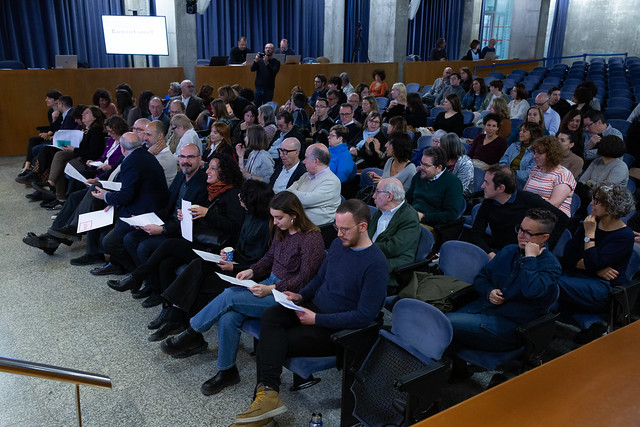Raewyn Connell, a reference in gender studies and an advocate for social justice, has been awarded an honorary doctorate by UPF
Raewyn Connell, a reference in gender studies and an advocate for social justice, has been awarded an honorary doctorate by UPF
Raewyn Connell, a reference in gender studies and an advocate for social justice, has been awarded an honorary doctorate by UPF
Raewyn Connell, professor emerita at the University of Sydney and expert sociologist in masculinities, has been awarded an honorary doctorate by UPF at a ceremony that took place on 17 April in the auditorium of the Ciutadella campus. The academic ceremony, during which Raewyn Connell was connected online from Sydney, was presided by Laia de Nadal, UPF rector, and Tània Verge, a full professor of Political Science at UPF and minister of Equality and Feminisms of the Catalan Government, and patron of the doctorand. The laudatio speech was given by several members of the University’s Gender and Inequalities Research Group (GRETA).
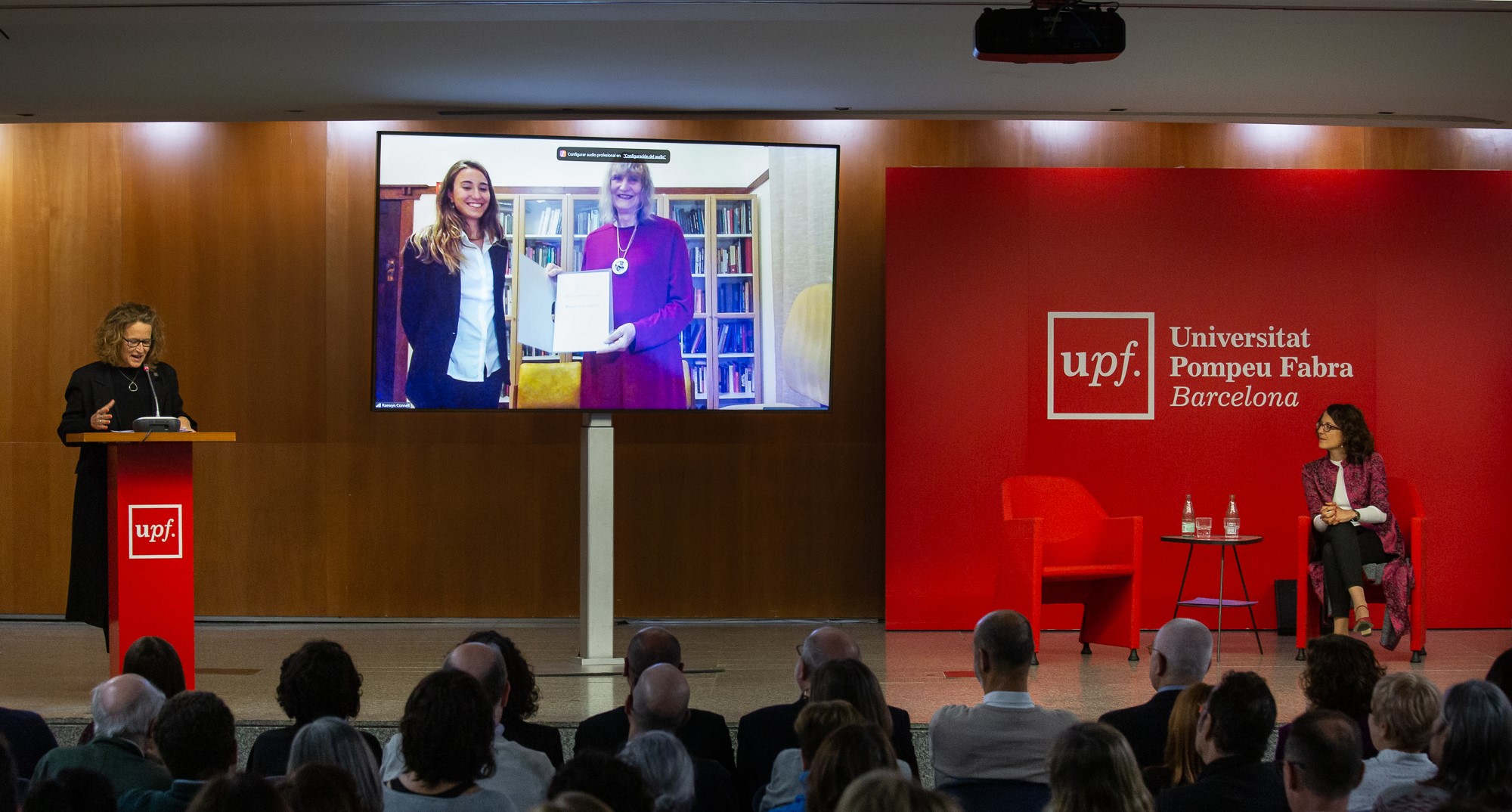
UPF has awarded an honorary doctorate to Raewyn Connell, professor emerita at the University of Sydney (Australia), an important reference in the fight for justice, equality and peace, and against gender-based violence. The University bestows its highest distinction in recognition of her studies and research on the construction of class and gender hierarchies and masculinities, and as a transgender woman, is contributing to promoting parity in institutional actions and increasing diversity in the profiles of awardees of the UPF honorary doctorate.
The academic ceremony took place on 17 April 2023, at 9.30 am, in the auditorium of the Ciutadella campus, during which the doctorand was connected online from her home in Sydney, visible at all times on a large screen above the stage. The event was streamed via the University website and could be followed on social networks, with the hashtag #ConnellHonorisUPF.
Laia de Nadal, UPF rector, and Tània Verge, minister of Equality and Feminisms of the Catalan Government and a full professor at the UPF Department of Political and Social Sciences, who acted as Raewyn Connell’s patron, presided over the investiture ceremony.
The laudatio speech was given by Maria Rodó, a professor at the UPF Department of Political and Social Sciences, together with Joel Cantó, Shahrzad Goudarzi and Maria Martí, members of the University’s Research Group on Gender and Inequalities (GRETA).
Two audiovisuals based on the work of Raewyn Connell, the performances of Vincular-se (on the piano), by Clara Peya, and the work Desvincular-se, by Les Impuxibles (sisters Clara and Ariadna Peya), both pieces composed by Clara Peya herself, and Gaudeamus igitur (to bring the event to a close), by Quartet Pètal, completed the ceremony.
She is the 20th person UPF has made doctor honoris causa, the sixth woman, to receive the highest distinction that the University awards in recognition of a person’s scientific or university training or values that can be seen to identify with the institution.
- Wellcome by Laia de Nadal, speech by Tània Verge and justification of the awarding of the honorary doctorate
- Video screening of Lot’s wife and piano performence of Vincular-se
- Laudatio speech by Maria Rodó, Joel Cantó, Shahrzad Goudarzi and Maria Martí
- Investiture of the doctorand
- Acceptance speech by Raewyn Connell
- Performance of Desvincular-se and video screening of With the people -from letter to my daughter
- Speech by the rector
- Photo album of the ceremony
- Library virtual bookshelf
- Biography of Raewyn Connell
Welcome by Laia de Nadal, speech by Tània Verge and justification of the awarding of the honorary doctorate
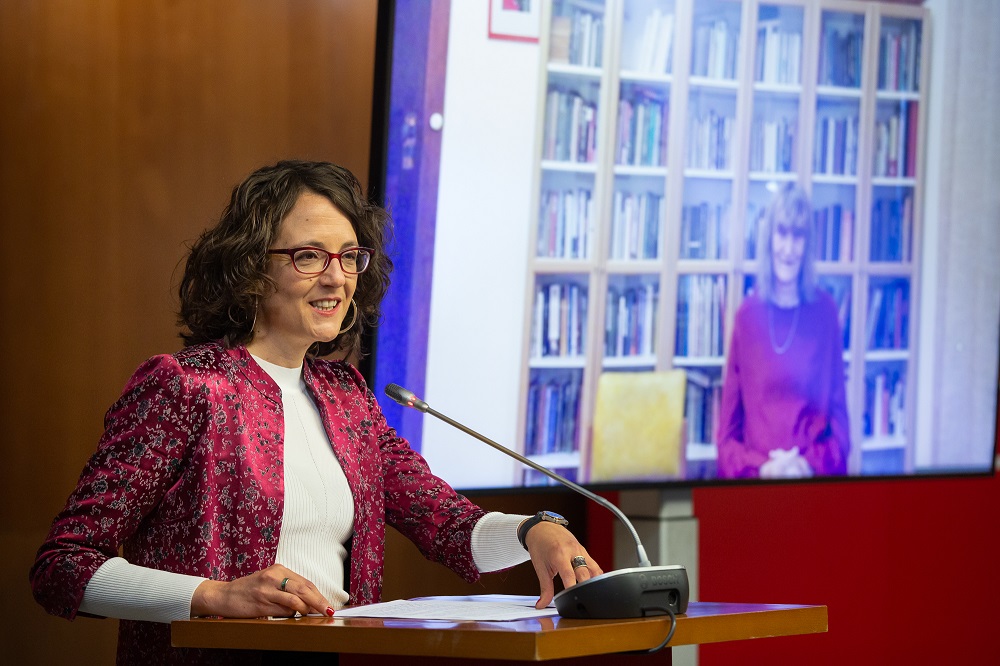
The ceremony was opened by Laia de Nadal, UPF rector, who highlighted the inspiring work of Raewyn Connell, both academically and artistically, as reflected in the repertoire of the programme of the event.
Then, Tània Verge, minister of Equality and Feminisms of the Catalan Government and a full professor with the UPF Department of Political and Social Sciences and patron of the doctorand, gave her speech in which she highlighted the value of awarding Raewyn Connell an honorary doctorate.
>Speech by Tània Verge (pdf)
“Awarding an honorary doctorate to professor Connell is a powerful statement in a context in which gender studies and critical race studies are being attacked by anti-rights groups and have already been banned or de-funded in countries such as Hungary, Poland and in several US states. Thus, the message gleaned from this ceremony is one of explicit support for gender studies and institutional recognition of their academic value”, she stressed.
Tània Verge highlighted that professor Connell’s contributions are most relevant to policy practices, including university policies, because “they offer a critical insight into the ways in which social structures and power dynamics shape forms of knowledge, limit the scope of possible policy solutions, and affect the lives of marginalized communities”.
Finally, she underlined that, with this recognition, “UPF demonstrates that commitment to academic excellence goes hand in hand with commitment to equality, which must include the furthering gender balance in awards: professor Connell is the sixth woman recipient of an honorary doctorate at UPF. Six women of the twenty honorary doctorates (30%) awarded by the University since its foundation in 1990.
Tània Verge’s speech gave way to the reading of the agreement by the UPF Board of Governors, of 9 December 2020, granting the title of honorary doctor to Raewyn Connell, by Enric Vallduví, UPF secretary general:
“The University wishes to recognize her studies and her research on the construction of class and gender hierarchies and on masculinities. She is a significant reference in the fight for justice, equality and peace and against gender violence. In addition, this distinction contributes, as a transgender woman, to promoting parity in institutional action and increasing diversity in the profiles of honorary PhD awardees”.
Screening of the video Lot’s wife and piano rendition of Vincular-se
The first part of the event was completed with an audiovisual screening and an artistic performance. On the one hand, the screening of the video Lot’s wife, with text by Raewyn Connell, made by Clàudia Barberà, UPF alumni of Audiovisual Communication, and the voice of Carmen Pérez, a full professor at the UPF Department of Translation and Language Sciences.
Then, Clara Peya, a pianist and a composer, performed the piece Vincular-se on piano (supplied by Pianoservei, an entity that helps young performers, newly-created festivals and fundraising concerts get access to the instrument).
Then, Clara Peya, a pianist and a composer, performed the piece Vincular-se on piano (supplied by Pianoservei, an entity that helps young performers, newly-created festivals and fundraising concerts get access to the instrument).
Laudatio of Raewyn Connell
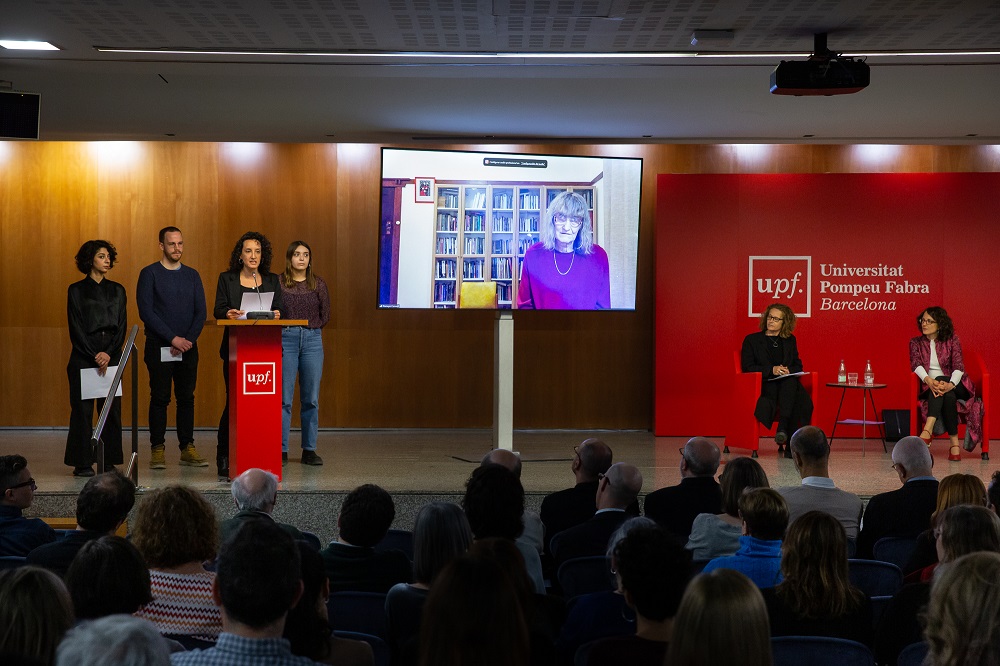
The laudatio speech was given by Maria Rodó, a professor at the UPF Department of Political and Social Sciences, together with Joel Cantó (a doctorand), Shahrzad Goudarzi (a lecturer) and Maria Martí (a student), all members of the University’s Research Group on Gender and Inequalities (GRETA). They all wished to stress that Raewyn Connell is an exceptional scholar, an advocate of social justice, who has made major contributions to numerous fields of knowledge, which have impacted academia and society in general.
> Laudatio of Raewyn Connell by Maria Rodó, Joel Cantó, Shahrad Goudarzi and Maria Martí (pdf)
> Video of the laudatio speech
Excerpts of the laudatio speech
Maria Rodó
Raewyn Connell is a reference in the social sciences, as her work has transformed our understandings of gender, sexuality and power dynamics.
Her trajectory not only as a scholar but also as an activist and an advisor to governments shows how academic research can have a profound social impact.
In the current context characterized by the rise of anti-gender, racist, homophobic and transphobic discourses, recognizing, engaging and making visible Connell’s research is a necessary endeavour. Her perspective demonstrates the need to contextualize the process of knowledge production, and her contributions on the southern theory, specifically, challenge the dominance of Western and Eurocentric knowledge systems and seek to incorporate alternative perspectives from the Global South.
Academic institutions can potentially contribute to social change also with political commitment and engagement to the multiple processes of transformation that are taking place.
Shahrzad Goudarzi
Raewyn Connell’s work sheds light on the unequal division of labour and power structures that underpin and sustain the work of knowledge production.
Employing transdisciplinary and multi-method approaches, Dr. Connell puts Southern thought in a dialogue with Northern sociologies of knowledge to understand how academic practices are derived from historical, political and material forces.
There is so much to be praised about Dr. Connell’s work on Southern theory that it cannot fit into a speech of a just few minutes.
Dr. Connell made visible the invisible, questioned the unquestionable, and in doing so laid bare the hidden hegemonic frameworks at play in how knowledge is acquired, controlled and disseminated.
Maria Martí
In her work, professor Connell examines the many implications that the education system has for social justice
Education is certainly a process. It is one of the great contributions that Dr. Connell has made, and one with which I fully agree.
Thanks to Dr. Connell’s findings, we can see how the university revolves around how the conception of the knowledge creation process shifts and alters its preferences according to different changes.
Thanks to referents like her, many of us can feel supported in the feminist struggle and, also with the search for knowledge as a process of our own emancipation.
Joel Cantó
Professor Connell’s pioneering work has shed light on the complexity and diversity of masculinities and their impact on individuals and society.
Raewyn Connell challenged the traditional notion of masculinity as a singular, monolithic concept and instead highlighted its multiple forms and patterns.
Men’s interaction with women, as well as with each other, their gender-related lifestyles, cultures, group formations, and personal relationships can be understood in terms of diverse patterns of “masculinity” varying according to the specific context and time.
Today, as we pay tribute to professor Connell, let us reflect on the importance of her work as a pioneering effort to challenge traditional gender norms and create a more just and equitable society.
Investiture of Raewyn Connell as an honorary doctor
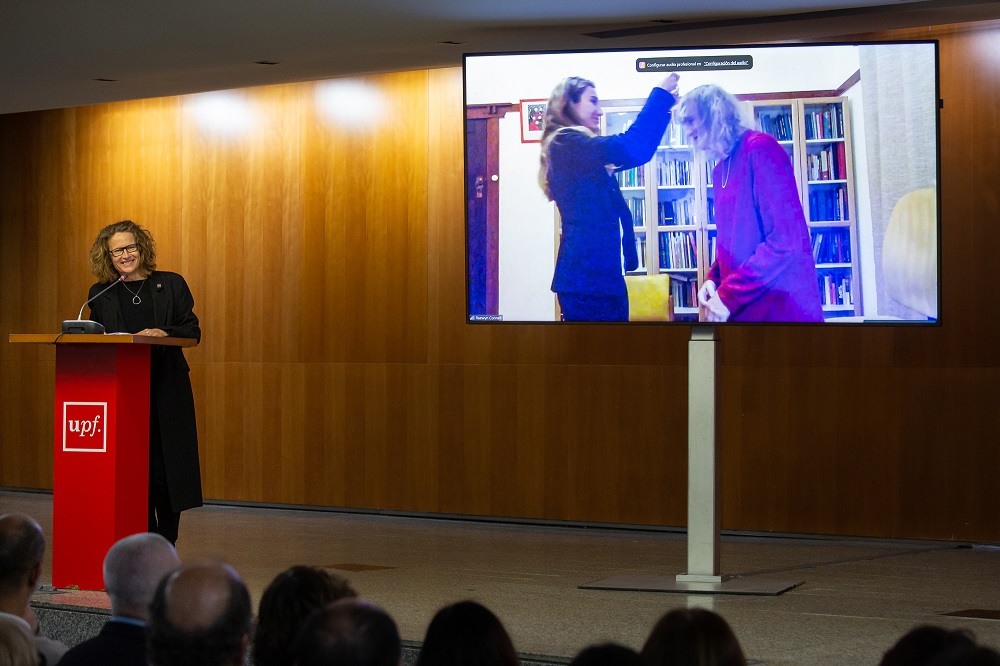
The most solemn moment of the ceremony was the investiture of Raewyn Connell as doctor honoris causa: “You have been appointed doctor honoris causa by the UPF Board of Governors in recognition of your significant merits. By virtue of the authority vested in me, I award you this medal, a symbol of this title, and the diploma”, rector Laia de Nadal declared.
Next, the rector asked Àngela Anés, an alumni of the UPF bachelor’s degree in Advertising and Public Relations, as an ambassador of the University (who accompanied Raewyn Connell in Sydney), to present her with the honoris causa Medal, which had been previously sent to her. With professor Connell now wearing her medal, Angela Anés gave her a symbolic embrace as a sign of her incorporation into the Senate of doctors of the University, which was followed by warm applause, from the auditorium, as a sign of recognition by the entire university community.
Acceptance speech by Raewyn Connell
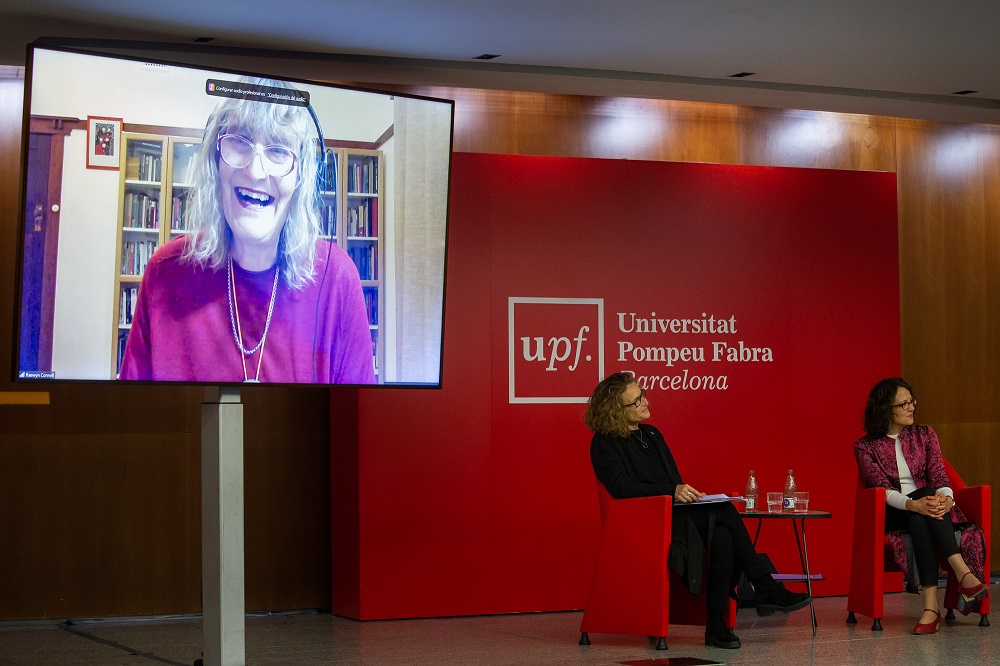
Raewyn Connell, at the beginning of her speech “from the far south of the world” regretted not being able to be at UPF in person, since “I am afraid I am extremely vulnerable to the covid virus so I am not able to do long-distance travel”. “My very deep thanks for this award of this honorary doctorate. Thank you very much!”, she emphasized.
> Video of Raewyn Connell acceptance speech
Excerpts from the acceptance speech
I worked as a full-time academic for 44 years, after attending university as a student in the legendary 1960s.
With the world on fire, I thought we desperately needed a better understanding of how our societies work, and knowledge that could help towards democratic change. That’s why I changed to the social sciences, which produce the most important knowledge to transform society.
As we face the worsening of climate change, we need to understand its multiple social causes and the social, cultural and economic changes we need to make to prevent environmental catastrophe.
I have tried to map the structures of society and understand social practices in various areas: gender, class, sexuality, coloniality and global power.
I have studied the history of power and privilege, but I have also tried to draw attention to subaltern voices.
In the face of inequalities in the relationships of moderate gender structures, it seemed important to think specifically about men and their gender practices. So I started researching the creation of masculinities, the differences between forms of masculinity and the processes of change in men's lives, which are topics of my book “Masculinities” (...). These issues have increasingly been seen as important to more people. A “significant change” has been felt in this area.
At least half of my research has been conducted as a team, and I owe a lot to my colleagues. I came to see knowledge creation as a fundamentally collective project.
Universities are privileged institutions. We have certain powers, especially the capacity to communicate, and we must do so with imagination.
In addition to the corporatization of our own sector, we face powerful anti-intellectual movements, such as climate denial and the anti-gender movement.
But universities matter, and we also have strengths and traditions. The job of universities, academics and intellectual workers is to push the boundaries, to challenge conventions through our work, and in our teaching and research, to establish truths, however uncomfortable the truths may be and however much they might be challenged.
When it comes to coping with the harshest conditions we are currently facing, the great asset is the shared and social nature of intellectual work.
Supporting and protecting the knowledge workforce, with all its capabilities, is perhaps the most important contribution that can be made by the senior generation, based on our experience, and also protecting the (transformative) force of knowledge.
Performance of the work Desvincular-se and screening of the video With the people -from letter to my daughter
Having finished her acceptance speech, Raewyn Connell listened to the live performance, in the auditorium, of the work Desvincular-se, performed by Les Impuxibles (sisters Clara and Ariadna Peya, pianist and dancer, respectively).
A second audiovisual screening, With the people -from letter to my daughter, with text by Raewyn Connell, made by Clàudia Barberà and narrated by Carmen Pérez (as a complement to the first video of the event) brought the ceremony closer to its end.
> Video With the people –from letter to my daughter
Speech by rector, Laia de Nadal
Laia de Nadal, UPF rector, gave the last speech of the event, in which she wished to emphasize that the academic baggage and values embodied by Raewyn Connell are a mirror, a source of inspiration and a guide for the University.
> Laia de Nadal speech (pdf)
> Video of the Laia de Nadal speech
Excerpts from the speech by Laia de Nadal
If we were to look for a common denominator in the teaching and research work carried out by professor Connell, it would probably be commitment, a commitment to social justice.
Surely, the institution I represent today, Pompeu Fabra University, has also been enriched by the intellectual and cultural corpus created by professor Connell
Thanks to the scientific and discursive contributions by people like professor Connell, we know that it is possible to shake such solid mental and institutional structures as the patriarchal ones - and also university ones - to achieve a more egalitarian world.
Professor Connell’s research on the role of educational institutions in the construction of gender and class mandates has served to raise further awareness of the role of education in shaping people and social structures.
Professor Connell embodies a way of understanding social equality and education that we share at our university and we try, each day, to implement.
The fact that a prestigious public university educational institution such as ours has awarded an honorary doctorate to Raewyn Connell -academic, activist, transgender woman- not only enriches our Senate with values and knowledge, but also becomes a forceful action of commitment by a public institution, ours, to equality and social justice.
So, thank you, Dr. Connell, for enriching our university community with your knowledge and for contributing to making Pompeu Fabra University an increasingly committed institution.
The ceremony ended with the performance, on the stage, of Gaudeamus igitur, by Quartet Pètal, formed by Andrea Martí (soprano), Helena Tajadura (contralto), Miquel Villalba (tenor), Lluís Arratia (bass), with all the people in attendance at the auditorium standing.
Photo album of the ceremony
< Photo album of the event posted on Flickr
UPF Library Virtual Bookshelf, with the available works of Raewyn Connell
On the occasion of Raewyn Connell's investiture as an honorary doctor by UPF, the University Library has created a virtual bookshelf with a selection of her works available in the UPFinder catalogue.
This initiative aims to contribute to disseminating the work of the Australian sociologist and recognize her person as a reference in the fight for justice, equality and peace, as well as in the fight against gender violence.
Biography of Raewyn Connell
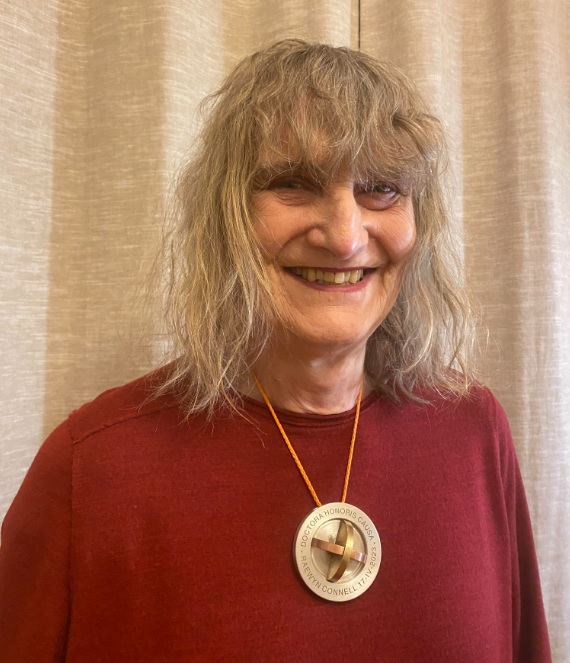
A long academic career in which she has held the chairs of Sociology and Education at the University of Sydney
Raewyn Connell (Sydney, 1944), who comes from a family uniting Melbourne’s professional bourgeoisie with rural settlers, graduated from the University of Melbourne and earned a PhD in Sociology from the University of Sydney. She actively participated in the student movement and the New Left of the 1960s, and then worked as a university professor and researcher.
In 1976 she became a full professor of Sociology (in a founding chair) at Macquarie University, where she inaugurated a new department that sought to embody academic democracy, as well as new perspectives in the field. In the early 1990s she moved to the University of California, Santa Cruz, USA, and then returned to lead a chair in Education at the University of Sydney, where she is currently a professor emerita. Throughout her career she has held visiting posts at the universities of Toronto, Harvard and Ruhr-Universität Bochum.
As a sociologist, Raewyn Connell became known for her research into large-scale class dynamics (Ruling Class, Ruling Culture, 1977; Class Structure in Australian History, 1980), and on how class and gender hierarchies are made and re-made in the daily lives of schools (Making the Difference, 1982; Teachers’ Work, 1985). She developed a social theory of gender relations (Gender and Power, 1987; Gender: in World Perspective, 2002/2015), which stresses that gender is a dynamic, large-scale social structure, not just a matter of personal identity.
Creator of the concept of “hegemonic masculinity”
Raewyn Connell is known internationally for her studies on masculinity. She was one of the founders of this field of research and the book Masculinities (1995, 2005) is the best known in this field. She coined the concept of “hegemonic masculinity”, which has been especially influential and sparked great debate, around which she has written about its applications in education, health and the reduction of violence.
Much of her research is based on biographical interviews, but she has also published studies on surveys, historical research, institutional analyses, and social theory. A compilation of her work, which combines several research projects, is Confronting Equality (2011). In 2019 she published The Good University, an attempt to explain how universities work, what has happened to them under the corporate regime, and what alternatives there have been in the past and could be in the future. On the other hand, is scheduled to publish in early May 2023 Raewyn Connell. Research, Politics, Social Change (published by Melbourne University Press), which aims to be a compendium of her work as a researcher over 40 years.
With long-term involvement in the labour movement, Raewyn Connell has been involved in various political and social causes, including the pacifist and feminist movements and support for public education. As a teacher, she has emphasized student control of learning processes and collaborative approaches to knowledge. She has been an advisor on United Nations initiatives on gender equality and peace-making, a member of the Australian Sociological Association (TASA), and president of its predecessor SAANZ. In 2010, the TASA created the biennial Raewyn Connell Award for Best Australian book of sociology.
Raewyn Connell is a fellow of the Australian Academy of Social Sciences and has received the American Sociological Association award for her contribution to the study of sex and gender, and the Australian Sociological Association award for her distinguished services to sociology in Australia. Retired from her professorship at the University of Sydney on 31 July 2014, she is a transgender woman who made the formal transition in the later stages of her life.

